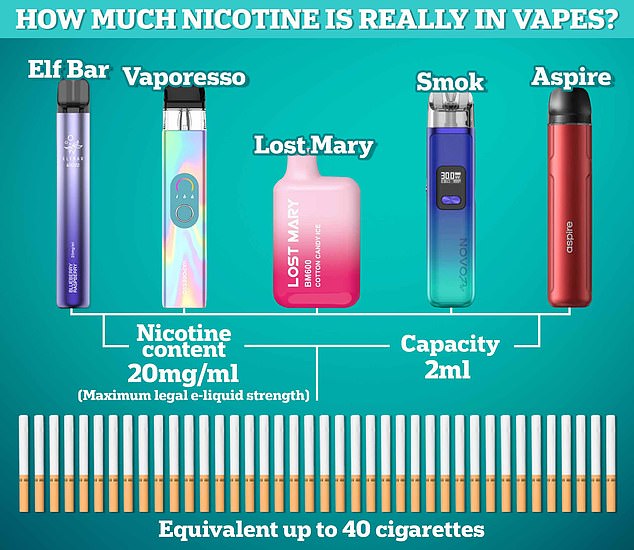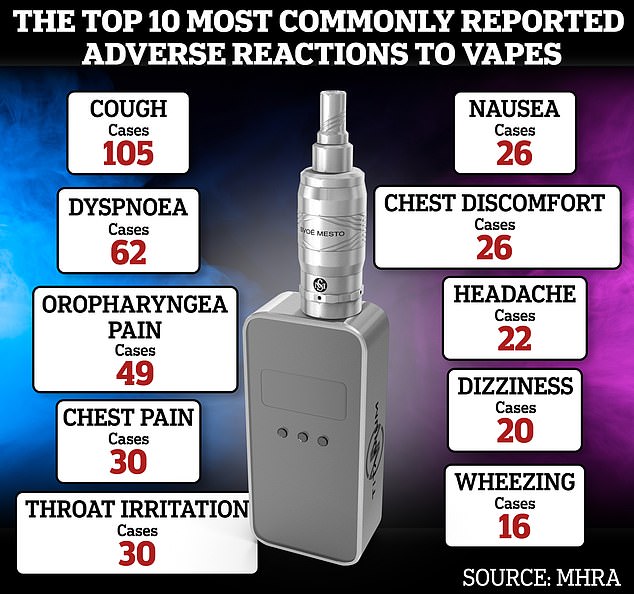One in ten adults in England now vapes, an eightfold increase in a decade, worrying new data reveals.
In contrast, only one in 80 is believed to have taken up the habit in 2013.
Worryingly, around one in six 18-year-olds who had never smoked before were also long-term users of these devices.
In a nod to the Government’s plan to ban disposable vapes, researchers said this was particularly worrying and “harmful to public health”.
Activists have long called for much tougher regulations, including an immediate ban on marketing to children and a tax on disposable vapes, which are most popular among teenagers.
Admission rates for “vaping-related disorders” in under-20s overall have also increased six-fold over the same period. This comes amid a growing e-cigarette epidemic among young people, which the Government has vowed to stamp out.
E-cigarettes allow people to inhale nicotine in the form of vapor, which is produced by heating a liquid, which usually contains propylene glycol, glycerin, flavorings and other chemicals.
Unlike traditional cigarettes, they do not contain tobacco and do not produce tar or carbon, two of the most dangerous elements.
The effect of nicotine on the brain is well known: within 20 seconds of inhalation, it triggers the release of chemical messengers such as dopamine, associated with reward and pleasure.
But it also increases heart rate and blood pressure and causes blood vessels to constrict. This is because nicotine triggers the release of the hormone adrenaline.
In the study, researchers at University College London surveyed nearly 180,000 adults about whether they smoked and what nicotine products they used.
Between October 2013 and October 2023, participants were asked about their use of a variety of nicotine products, depending on their smoking status.
Those who reported vaping for more than six months were considered long-term vapers.
Details of vaping frequency (daily or non-daily) and the main type of device used (disposable, refillable or pod) were also recorded.
Over a 10-year follow-up, they found that the proportion of adults who reported long-term vaping increased from 1.3 percent to 10 percent.
In 2021 alone, this percentage increased from 0.6 percent to 6.7 percent.
Among those who had never smoked regularly, rates also rose over the decade from 0.1 percent to 3 percent.
More than one in five (22.7 percent) 18-year-olds also reported vaping for more than six months, as of October 2023.
Writing in The BMJThe researchers said: “The recent rise in vaping among adults, particularly young adults, in England does not simply reflect an increase in experimental use, but rather that a substantial number of those who start vaping continue to do so in the long term.”
Despite NHS officials insisting it is safer than smoking, vaping is not without risks. E-cigarettes contain harmful toxins and their long-term effects remain a mystery.
Experts are concerned that high nicotine content may raise blood pressure and cause other heart problems.
Doctors have expressed fears that there could be a wave of lung diseases, dental problems and even cancer in the coming decades in people who picked up the habit at a young age.

Activists have long blamed predatory manufacturers for the growing crisis, alleging they are intentionally luring children with colorful packaging — unlike highlighters — and kid-friendly flavors like bubblegum and cotton candy.

As of February, the Medicines and Healthcare Products Regulatory Agency has recorded a total of 1,009 reactions to e-cigarettes. The 10 most common reports are listed below.

A shocking MailOnline investigation last year even uncovered vapes that looked like candy and brick-and-mortar stores selling the devices alongside chocolates and fruit gummies.
In April, a shocking study warned that e-cigarettes may increase the risk of heart failure.
Another suggestion is that vaping triggers cellular changes that may lead to cancer.
Earlier this year, MailOnline also found that the number of adverse side effects linked to vaping reported to UK regulators has now surpassed 1,000, five of them fatal.
The extensive list ranges from headaches to strokes and can be submitted by the general public and doctors.
Earlier this month, in the world’s first guidance setting out possible interventions to help people stop using tobacco products, the World Health Organization called the evidence around e-cigarettes “complex.”
Vaping cannot be recommended as a way to quit smoking because too little is known about its harms and benefits, the UN agency said.
In an effort to stamp out the UK’s childhood vaping epidemic, former Prime Minister Rishi Sunak pledged last year to ban disposable e-cigarettes altogether.
In today’s King’s Speech, Keir Starmer revealed that his law… Ministers are given the power to restrict flavours and the promotion of vapes in an effort to thwart the e-cigarette epidemic among UK children.
This could change the way nicotine-laden vapes are displayed in stores, moving them away from other products such as candy.
They would be limited in flavors and sold in plain, tobacco-style packages.
Council officers will also have powers to hand out £100 on-the-spot fines to shops that break the rules.

